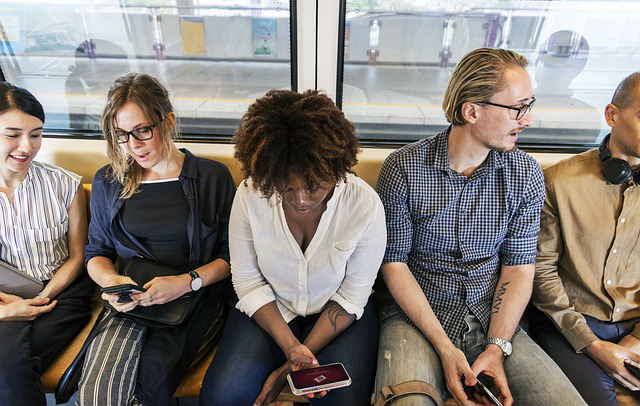
The harms of social media are well documented. It can be addictive, damaging, and toxic. Watching the highlights of other people’s lives and chasing the validation of likes and comments can destroy your self-esteem and steal hours of your day. Now, more than ever, social media provides a platform for echo chambers, division (even among family and friends), which inevitably leads to anxiety and even depression.
However, social media can be a way to connect, especially for older people, those in rural areas, people with disabilities, or people who can’t find others with similar interests nearby. With the right approach, social media can be a positive and productive experience that fosters a sense of community. The isolation we’ve all experienced over the past year can also be semi-alleviated through skillful use of social media in appropriate doses.
Social media can enhance your life, but it takes work to avoid common social media traps. Here are five ways to make social media a positive force in your life.

1. Set Your Intentions
Before making any changes to your social media habits, take some time to think about why you use Facebook, Instagram, Twitter, or whichever platform is your preference.
I have three reasons for using social media. I want to:
- Stay connected with far-away friends and family.
- Build an audience for my writing.
- Learn about ideas and people I might not encounter offline.
If someone — or something — in my feed is bothering me and it’s not related to one of these goals, I hide, mute, or un-follow that person or account.
I’ll admit, I do follow some accounts that don’t fit into those three categories. We added a Boston Terrier to our family this year, so now I follow an Instagram account that’s simply photos of Boston Terriers. This doesn’t connect me with friends, it doesn’t help my career, I’m not learning anything, but it does make me happy. That’s important, too. It may even be valuable to add that to your list of intentions.

2. Let Go of the Negative
Once you’ve identified the reasons you use social media, it’s time to clean up your feed. To do this effectively you’ll need to cultivate an awareness of your reactions.
Just like in meditation when you focus on your breathing, spend some time observing your reactions to your social media feed. If that former co-worker’s humble brags make you crazy, let that person go on social media. If a high school acquaintance posts nothing but political rants, give yourself permission to hide, un-follow, or un-friend that person. One thing that many people notice is that people who they love and value in real life can be intolerable on social media. It may be best to preserve your real life relationship with that person by hiding their social media persona.

3. Connect with Your Friends in Person
With so much of our lives shared online it’s easy to forget to pick up the phone or make plans with friends “IRL” (in real life). Don’t let the connection you feel through social media take the place of frequent and regular in-person interactions. And as many of us have learned over the first several months of 2020, video chats are kind of lame. For social calls we’ve actually found that a good old fashioned phone call is far superior if you can’t get in person time.
When you talk with your friend over dinner or on the phone you learn about everything your friend has left out of the social media feed, and in turn you can share the things that are too personal for you to reveal online. The person whose life looks shiny and perfect on Instagram (or even differs from you politically) may be struggling with some of the same issues as you and care about the same outcomes you do, but you’ll never know if you don’t reach out.

4. Schedule or Limit Social Media Time
Even a well-edited social media feed can be a waste of time and an unnecessary distraction. If you find yourself getting sucked into Facebook and Instagram when you should be working or paying attention to those around you, limit your social media access.
Some people like to schedule in their social media, telling themselves they can only go on for an hour each day. iPhones and Androids offer built in options for time-limiting access to apps and websites. I like to take the opposite approach and declare social media off-limits at certain times during the day. We don’t allow phones at the table during dinner and I charge my phone outside of my bedroom at night. I also make an effort to stop checking social media about an hour before bedtime. It may even be useful to stop using it from dinner until bedtime. Our concept of family time has changed so dramatically with the advent of digital technology (including TV with practically limitless options for consumption) that we often forget that being in the same room with someone is not the same as being with someone.
My biggest challenge is avoiding social media when I’m working at my computer. If I find I’m procrastinating too much or having trouble resisting the lure of the feed, I activate the Freedom app installed on my computer. This blocks any site I choose for any amount of time, which forces me to focus on the task at hand.

5. Stop Lurking and Engage
Even if you don’t clean up your friend list or set limits on your social media time, an easy way to make social media a positive force in your life is to engage instead of lurk. Researchers have found that people who comment and connect with friends are happier on social media than people who scroll without commenting.
Scrolling and not engaging can feel very isolating. Watching people have conversations that you’re not involved in can lead to feelings of loneliness. Keep in mind that you don’t have to invite a long conversation. A simple congratulations or I love this! can help keep you connected to friends and family.
Of course, not all commenting is created equal. Arguing with people or getting into fights with strangers is not a good way to engage. Stay positive and supportive, and don’t make a comment online you wouldn’t say to that person’s face. This can be especially true when you cross virtual paths with someone you haven’t seen or spoken to in a long time. Your first interaction with a long-lost friend shouldn’t be a criticism or a snipe if you’re looking for connection.
If you’re in a Facebook group, get involved. Share your own struggles and successes and support the ups and downs of others. Real communities can be formed online, but just like in real life, being part of a community is a two-way street.
What Role Does Social Media Play for You?
Some people naturally fall into a healthy online life that mirrors the way they live offline, but if social media is having a negative impact on your happiness, try some of these strategies for managing your social media.
The Whole Life Challenge often includes a Well-Being Practice to work on things like limiting social media and computer time, giving you the structure to develop habits that help give you a healthy mind along with a healthy body. Because, deep down, we all know health involves a lot more than the physical. So give your social media a “check up” and make sure it’s contributing to a happy, healthy lifestyle.



































